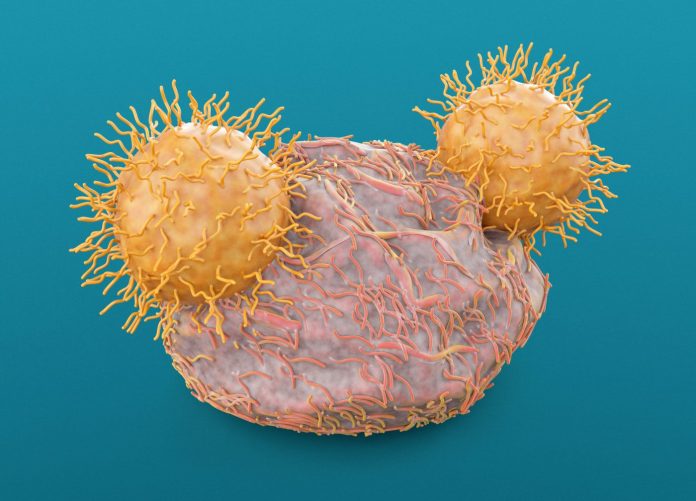
Gut microorganisms influence non-Hodgkin lymphoma patient outcomes to chimeric antigen receptor T-cell (CAR T) therapy, according to a recent multinational research collaboration.
A key finding of this study was that patients who had higher levels of the bacterium Bifidobacterium longum had an improved overall survival rate after CAR T. The team also developed a machine learning algorithm that identified other bacterial groups associated with either improved or poorer CAR T outcomes.
“Patients who had antibiotics had worse CAR T responses,” Michael Jain, MD, PhD, told Inside Precision Medicine. He is co-senior study author and associate member of Moffitt Cancer Center’s Department of Blood and Marrow Transplant and Cellular Immunotherapy.
He added that, “This is something we may be able to manipulate to improve outcomes.”
The new study was published last week in Nature Medicine. The team included researchers from Moffitt, MD Anderson Cancer Center, and three German institutions—University Hospital of the Ludwig Maximilian University, University Hospital Heidelberg, and University Hospital Regensburg.
Microorganisms live throughout most of the human body, making up the microbiome. It is estimated that there are trillions of microorganisms in the body. These primarily comprise bacteria, but also include viruses, fungi, and yeast. The microbiome can influence many human processes, including to cancer treatments, such as immunotherapies and stem cell transplants.
The microbiome, Jain points out, is effected by what you eat and where you live. Which is why they wanted to collaborate with researchers in another region.
CAR T is a personalized treatment approach where a patient’s own T cells are harvested, genetically engineered in a laboratory to target a specific cancer marker, expanded in number, and then infused into the patient. Such treatments are approved to treat several types of blood cancers, including lymphoma, leukemia, and multiple myeloma.
For this study, the team analyzed the microbiome from 172 non-Hodgkin lymphoma patients who relapsed or were refractory to prior treatment. The team discovered that patients who had taken strong, broad-spectrum antibiotics before receiving CAR T cell therapy had less microbiome diversity and poorer outcomes to treatment.
However, the researchers also determined these poor outcomes could be due to a higher tumor burden among the patients who received antibiotics and a more suppressed immune system. Because tumor burden could influence antibiotic use and outcomes, the researchers decided to focus on patients who received either no or lower-risk antibiotics.
The team used these data to create a machine learning algorithm to predict CAR T outcomes based on patient microbiomes. The algorithm was tested with from patients in Germany and validated in a U.S. population. They write that it, “…robustly segregated long-term responders from non-responders.”
The team’s analysis identified bacterial groups associated with either improved or poorer CAR T outcomes. For example, the bacterium Bacteroides eggerthii was associated with a higher chance of developing a response to treatment, while Bacteroides stercoris was associated with patients not achieving a response.
Bacteroides, Ruminococcus, Eubacterium, and Akkermansia were most important in determining CAR-T responsiveness, with Akkermansia also being associated with pre-infusion peripheral T cell levels in these patients.
“Understanding the causal nature of possible microbiome contributions to CAR T effectiveness and adverse effects may enable better understanding of differential CAR T-cell activation, persistence and clinical efficacy, and ultimately the prediction of response to CAR T prior to treatment,” said Jain.













